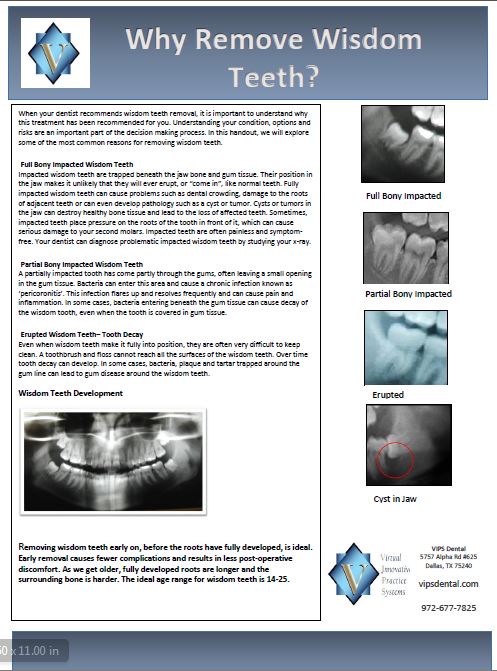The Problems With Wisdom Teeth
April 14, 2016
When your dentist recommends wisdom teeth removal, it is important to understand why this treatment has been recommended for you. Understanding your condition, options and risks are an important part of the decision making process. In this handout, we will explore some of the most common reasons for removing wisdom teeth.

Full Bony Impacted Wisdom Teeth
Impacted wisdom teeth are trapped beneath the jaw bone and gum tissue. Their position in the jaw makes it unlikely that they will ever erupt, or “come in”, like normal teeth. Fully impacted wisdom teeth can cause problems such as dental crowding, damage to the roots of adjacent teeth or can even develop pathology such as a cyst or tumor. Cysts or tumors in the jaw can destroy healthy bone tissue and lead to the loss of affected teeth. Sometimes, impacted teeth place pressure on the roots of the tooth in front of it, which can cause serious damage to your second molars. Impacted teeth are often painless and symptom-free. Your dentist can diagnose problematic impacted wisdom teeth by studying your x-ray.
Partial Bony Impacted Wisdom Teeth
A partially impacted tooth has come partly through the gums, often leaving a small opening in the gum tissue. Bacteria can enter this area and cause a chronic infection known as ‘pericoronitis’. This infection flares up and resolves frequently and can cause pain and inflammation. In some cases, bacteria entering beneath the gum tissue can cause decay of the wisdom tooth, even when the tooth is covered in gum tissue.
Erupted Wisdom Teeth– Tooth Decay
Even when wisdom teeth make it fully into position, they are often very difficult to keep clean. A toothbrush and floss cannot reach all the surfaces of the wisdom teeth. Over time tooth decay can develop. In some cases, bacteria, plaque and tartar trapped around the gum line can lead to gum disease around the wisdom teeth.
Wisdom Teeth Development
Removing wisdom teeth early on, before the roots have fully developed, is ideal. Early removal causes fewer complications and results in less post-operative discomfort. As we get older, fully developed roots are longer and the surrounding bone is harder. The ideal age range for wisdom teeth is 14-25.
More info: www.vipsdental.com
No Comments »
No comments yet.
RSS feed for comments on this post. TrackBack URL
